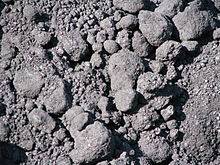US Petcoke Exports Surge
Petroleum coke exports from U.S. refineries hit a near-record 642,000 barrels per day in March as cheap natural gas and emissions regulations have slashed domestic consumption and forced producers to look abroad.
Coke consumption by U.S. power producers has dropped to around 5 million tonnes per year from almost 8 million a decade ago, according to the U.S. Energy Information Administration.
Total domestic consumption of petroleum coke has fallen from around 525,000 barrels per day to 350,000 since 2004.
Over the same period, exports have increased by the equivalent of nearly 200,000 barrels per and continue to rise in 2014.
Petroleum coke was the second-most exported product from the United States last year after low-sulphur diesel but easily ahead of gasoline, residual fuel oil and propane.
The fastest-growing markets have been China (which has taken around half of the total increase); Japan (forced to boost fossil-fuel power production following the Fukushima nuclear disaster); and Turkey (where electricity demand has been surging).
Bottom of the Barrel
The North American shale revolution has produced a huge volume of very light crudes prized for making gasoline, diesel and heating oil.
But for many refineries, especially along the coasts of Texas, Louisiana and California, the most valuable crudes are still heavy oils which they buy at a deep discount then crack at very high temperatures to produce extra diesel and petroleum coke.
Petcoke is solid, nearly pure carbon, with traces of hydrogen and small amounts of metals and other impurities left over from the original oil.
Most of the coke produced in oil refineries is sold as solid fuel for power plants and blast furnaces. But some high-grade cokes are calcined, a process like roasting, to refine them further and purify the carbon so it can be used to make electrodes used in aluminium and steel making.
Green Groups Opposed
Because coke is almost entirely composed of carbon rather than hydrogen, coke-fired power plants produce large amounts of carbon dioxide, which is a potent greenhouse gas.
Environmental groups are hostile to the production and trading of petroleum coke. In 2013, the Natural Resources Defense Council spotlighted problems with refinery coke being stockpiled near Chicago and Detroit ("Tar sands waste piling up on Chicago's South Side" Oct 18, 2013).
"Unless we want to see more cities in America blighted like this, we have to say no to tar sands projects like Keystone XL and the Flanagan pipeline," according to an NRDC spokesman. "These black mounds are just another reminder that we have to get serious about getting off of oil - this is what happens when you scrape the bottom of the barrel."
In fact, coke production and exports are not necessarily worse for climate change.
Most of the carbon-heavy molecules now sold in petcoke were formerly left as thick sludges to be sold as residual fuel oil for power plants and ships bunkers so they were already contributing to global warming.
More Efficient Process
Coke production is not restricted to refining Canada's tar sands and other heavy oils like Mexico's Maya and California's Kern. Most medium and heavy crudes will yield a large proportion of heavy residue on distillation which must go on to become heavy fuel oil, asphalt or petroleum coke.
U.S. refineries, especially the large facilities along the Gulf Coast and in the Midwest, have invested heavily in coking units over the last two decades to enable them to handle heavier crudes, produce more premium fuels and cut the amount of residual fuel oil.
Heavy investment in coking units essentially allows these refineries to process the whole barrel of crude and eliminate the production of what were once essentially waste products.
Coking allows for more complete separation between heavy carbon-dominated molecules and lighter gas oil-range fuels so it is a more efficient way to use petroleum and may reduce emissions (depending on how much energy is used in the process).
In principle, stationary coal and coke-fired power plants can also be made much more efficient than marine power plants, especially if supercritical and ultra-supercritical technology is used.
In practice, much of the refinery output is currently being sent abroad and burned in inefficient boilers. But the problem could be rectified with better boilers as well as carbon capture and storage systems if they become commercially viable.
U.S. petcoke exports: http://link.reuters.com/het22w
U.S. coke consumption: http://link.reuters.com/met22w
(By John Kemp, Editing by William Hardy)

